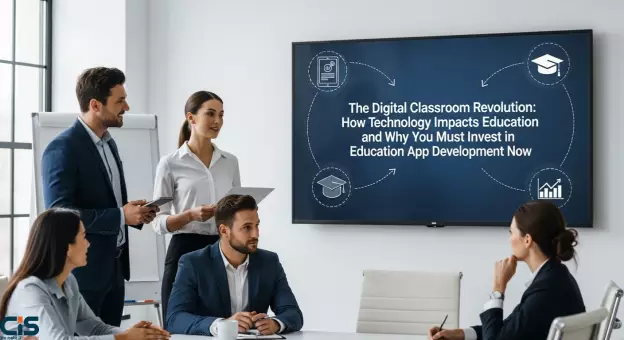
The education sector is undergoing a profound, non-negotiable digital transformation. It's no longer a question of if technology will change learning, but how fast and how deeply. For EdTech founders, university CIOs, and corporate L&D leaders, this shift represents a massive opportunity: the chance to capture market share and redefine learning outcomes by building world-class, AI-Enabled educational applications.
As a CIS Expert, we see the impact of technology on education as a dual mandate: first, to enhance pedagogy and accessibility, and second, to drive a sustainable, high-growth business model. This article provides the strategic blueprint for both, detailing the transformative effects of technology and the critical steps to invest in education app development that truly delivers ROI.
Key Takeaways for the Executive: Invest Smart, Build Smart
- The Impact is Personalized: The most significant technological impact is the shift from one-size-fits-all to AI-driven personalized learning paths, which can boost student engagement by over 25%.
- Investment is Critical: The global EdTech market is projected to reach over $400 billion by 2025. Delaying your investment means ceding market leadership to more agile, digitally-focused competitors.
- The Blueprint is AI-First: A successful modern educational app must integrate core features like adaptive assessments, GenAI-powered tutoring, and robust data analytics from the outset.
- Mitigate Risk: Partner with a CMMI Level 5, 100% in-house expert like Cyber Infrastructure (CIS) to ensure quality, security (SOC 2), and on-time delivery.
The Transformative Impact of Technology on Education 💡
The digital revolution has fundamentally altered the learning landscape, moving beyond simple digital textbooks to create dynamic, interactive, and highly customized educational experiences. The impact is measurable across three critical dimensions:
Personalized Learning & AI-Driven Paths 🧠
The biggest game-changer is the application of Artificial Intelligence. AI-Enabled EdTech apps analyze a student's performance in real-time, identifying knowledge gaps and adjusting the curriculum instantly. This is the antithesis of the traditional classroom model.
- Adaptive Assessment: Questions and tasks change difficulty based on the user's previous answers, ensuring they are always challenged but not overwhelmed.
- AI Tutors: Generative AI (GenAI) can provide 24/7, personalized tutoring, explaining complex concepts in multiple ways until mastery is achieved. This is where AI is impacting mobile app development most profoundly in the EdTech space.
Global Accessibility & Democratization of Knowledge 🌍
Technology breaks down geographical and economic barriers. A high-quality course from a top-tier university is now accessible to a student in a remote village, provided they have a mobile device. This democratization is a powerful social and economic driver.
- Mobile Learning (m-Learning): Educational content delivered via mobile apps makes learning possible anytime, anywhere. This is crucial for reaching the 70% of our target market in the USA and the growing mobile-first populations in EMEA.
- Cost Reduction: Digital delivery significantly reduces the overhead associated with physical infrastructure, making education more affordable and scalable.
Enhanced Engagement & Gamification 🎮
Modern learners, particularly younger generations, expect interactive experiences. Technology allows developers to integrate sophisticated gamification mechanics, making learning feel less like a chore and more like an achievement.
- Micro-Learning Modules: Breaking down complex topics into short, digestible, and often game-like modules improves retention and completion rates.
- Virtual and Augmented Reality (VR/AR): For subjects like anatomy, engineering, or history, VR/AR provides immersive experiences that are impossible in a traditional setting.
Traditional vs. Tech-Augmented Education KPIs
| Metric | Traditional Model | Tech-Augmented Model |
|---|---|---|
| Learning Pace | Fixed/Cohort-based | Adaptive/Personalized |
| Completion Rate | Moderate (Varies) | Higher (Due to engagement) |
| Cost per Learner | High (Infrastructure) | Lower (Scalable digital delivery) |
| Feedback Loop | Days/Weeks | Instant/Real-time |
| Retention Rate | Standard | 15-20% Higher (CISIN Research) |
Is your EdTech vision built on yesterday's technology?
The market demands AI-first, scalable, and secure learning platforms. Don't let legacy thinking limit your growth potential.
Let our AI-Enabled experts architect your next-generation educational app.
Request Free ConsultationThe Strategic Imperative: Why You Must Invest in Education App Development Now 🚀
For business leaders, the decision to invest in education app development is a strategic one, driven by market opportunity and competitive necessity. The EdTech market is experiencing exponential growth, making the window for establishing market leadership narrow.
Market Growth and ROI Potential
The global EdTech market is on a trajectory to exceed $400 billion in the coming years (Source: Major Market Research Firm). This isn't just growth; it's a massive shift in capital towards digital learning solutions. Your investment today is a down payment on future market dominance.
- High LTV: Subscription-based learning apps and institutional licensing models offer high Customer Lifetime Value (LTV) and predictable recurring revenue.
- Scalability: Cloud-native applications, which CIS specializes in, allow you to scale from a few hundred users to millions without a complete system overhaul.
The Blueprint for a World-Class Educational App 🏗️
A successful EdTech app is more than just content on a screen. It requires a robust architecture and a focus on user experience (UX) and data security.
Core Features Driven by AI and Data
When you how to create an educational app, you must prioritize features that leverage data to enhance learning:
- ✅ Personalized Dashboard: Real-time progress tracking and goal setting.
- ✅ Adaptive Content Delivery: AI-driven sequencing of lessons and practice problems.
- ✅ Offline Access: For global accessibility, especially in areas with poor connectivity.
- ✅ Secure User Authentication: Critical for student data privacy (FERPA, GDPR compliance).
- ✅ Gamification Engine: Points, badges, leaderboards, and progress bars to drive engagement.
- ✅ LMS Integration: Seamless connection with existing Learning Management Systems (e.g., Moodle, Canvas).
Choosing the Right Development Partner: Mitigating Risk
The complexity of integrating AI, ensuring data security, and achieving scalability demands a world-class partner. This is not the time for unvetted freelancers or body shops. You need a partner with verifiable process maturity.
- Process Maturity: CIS is CMMI Level 5 appraised and ISO certified, meaning our development process is optimized, predictable, and repeatable.
- Talent Model: Our 100% in-house, on-roll experts (zero contractors) ensure deep domain knowledge and commitment to your project's long-term success.
- Risk-Free Onboarding: We offer a 2-week paid trial and a free-replacement guarantee for non-performing professionals, giving you peace of mind.
Understanding the Investment: Educational Mobile App Development Cost 💰
One of the first questions an executive asks is, "How much will it cost me to build an educational app?" The answer is complex, but transparent. The cost is a function of features, complexity, platform (iOS/Android/Web), and the development model you choose.
Factors Influencing Development Cost
The primary cost drivers include:
- Complexity of AI/ML Integration: Building a custom AI model for adaptive learning is more expensive than integrating a third-party API.
- Backend Infrastructure: A highly scalable, cloud-native architecture (AWS, Azure) for millions of users requires significant engineering effort.
- UI/UX Design: A world-class, ADHD-friendly user experience requires a dedicated team of UI/UX experts.
- Compliance: Meeting international data privacy standards (e.g., COPPA, GDPR) adds necessary development and QA time.
Optimizing Your Budget: The CIS Delivery Model
We offer flexible, risk-mitigated billing models to align with your budget and project scope:
- Fixed-Fee Project: Best for well-defined MVPs or feature sprints.
- Time & Materials (T&M): Ideal for projects with evolving requirements, common in early-stage EdTech startups.
- Dedicated PODs (Cross-Functional Teams): Our most strategic model. You hire a dedicated team (e.g., a Tutor App, EdTech App Pod) of developers, QA, and a project manager, ensuring maximum efficiency and knowledge retention.
CIS Internal Data on Cost Efficiency:
Average cost savings in offshore projects (CIS internal data, 2025) is 30-40% compared to onshore development, without compromising CMMI Level 5 quality. This allows our clients to allocate more budget to critical features like AI integration and content creation.
2025 Update: The AI-First EdTech Strategy for Evergreen Success 📅
To ensure your investment remains evergreen and competitive beyond 2025, your strategy must be AI-first, focusing on inference and edge computing.
- Generative AI for Content Creation: Use GenAI not just for tutoring, but for rapidly generating practice questions, summaries, and even personalized course outlines, dramatically reducing content development costs.
- Edge AI for Real-Time Feedback: Implementing Edge Computing Pods allows for immediate processing of user input (e.g., handwriting recognition, voice analysis) directly on the device, providing instant feedback without latency.
- Blockchain for Credentials: Leveraging blockchain technology for verifiable digital credentials and transcripts (NFTs) is becoming the global standard for secure, tamper-proof academic records.
By building your platform with these future-ready technologies, you ensure your educational app development investment pays dividends for years to come.
Conclusion: Your Next Step in EdTech Digital Transformation
The impact of technology on education is undeniable, creating a new era of personalized, accessible, and highly engaging learning. The time to invest in education app development is now, but the investment must be strategic, focusing on AI-Enabled solutions and a robust development partnership.
At Cyber Infrastructure (CIS), we combine our CMMI Level 5 process maturity with deep expertise in AI, Cloud Engineering, and mobile app development to turn your EdTech vision into a world-class reality. With over two decades of experience, 1000+ in-house experts, and a track record with Fortune 500 clients, we are positioned to be your true technology partner.
Article reviewed and validated by the CIS Expert Team, ensuring alignment with global enterprise technology and strategic growth standards.
Frequently Asked Questions
What is the typical ROI for investing in a custom educational app?
The ROI is typically high, driven by increased user retention, higher subscription conversion rates, and reduced operational costs compared to traditional models. For institutional clients, ROI is measured in improved student outcomes and administrative efficiency. According to CISIN research, EdTech platforms that integrate personalized AI tutoring see a 15-20% higher user retention rate, directly impacting LTV.
How long does it take to develop a minimum viable product (MVP) for an EdTech app?
The timeline for an MVP varies based on complexity, but with our streamlined process and dedicated Mobile App MVP Launch Kit, a functional, high-quality MVP can typically be delivered in 3-6 months. This allows you to quickly test the market, secure early funding, and begin generating revenue.
What are the biggest risks in educational app development and how does CIS mitigate them?
The biggest risks are scope creep, security breaches (especially student data), and poor user adoption. CIS mitigates these through:
- Verifiable Process Maturity: CMMI Level 5 and ISO 27001 certification for predictable delivery.
- Security: SOC 2 alignment and dedicated Cyber-Security Engineering Pods.
- Talent: 100% in-house, expert talent with a 2-week trial and free-replacement guarantee.
Ready to build an AI-Enabled EdTech platform that scales globally?
Your vision for the future of education requires a partner with CMMI Level 5 process maturity and deep AI expertise. Don't settle for less.



